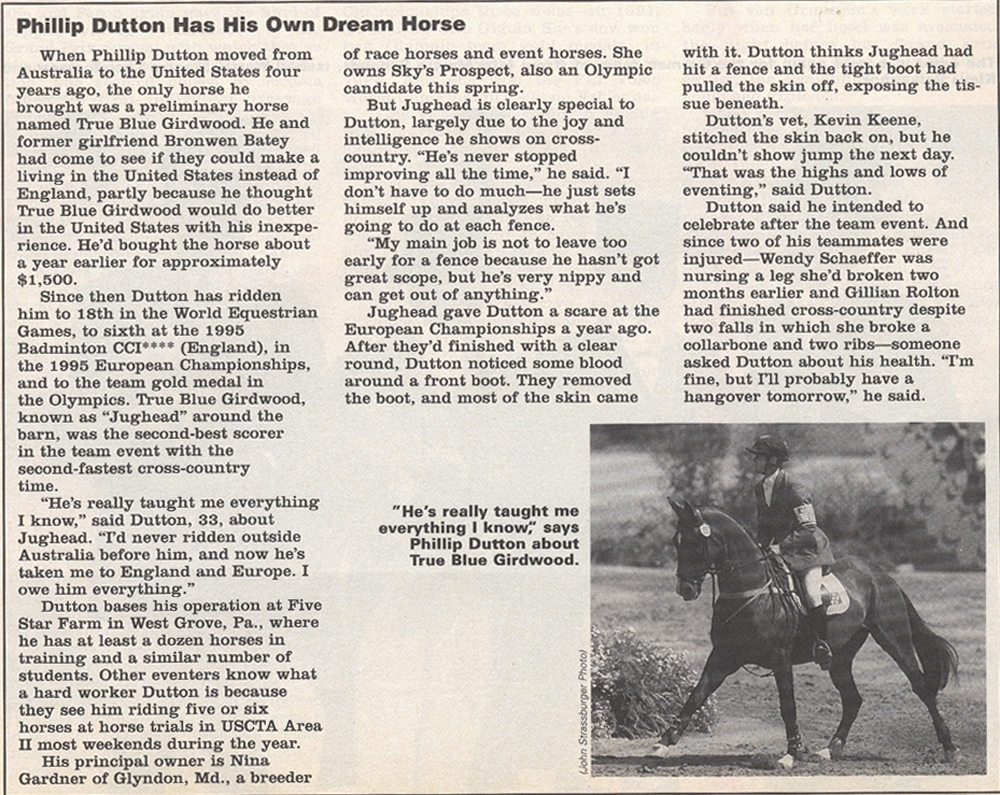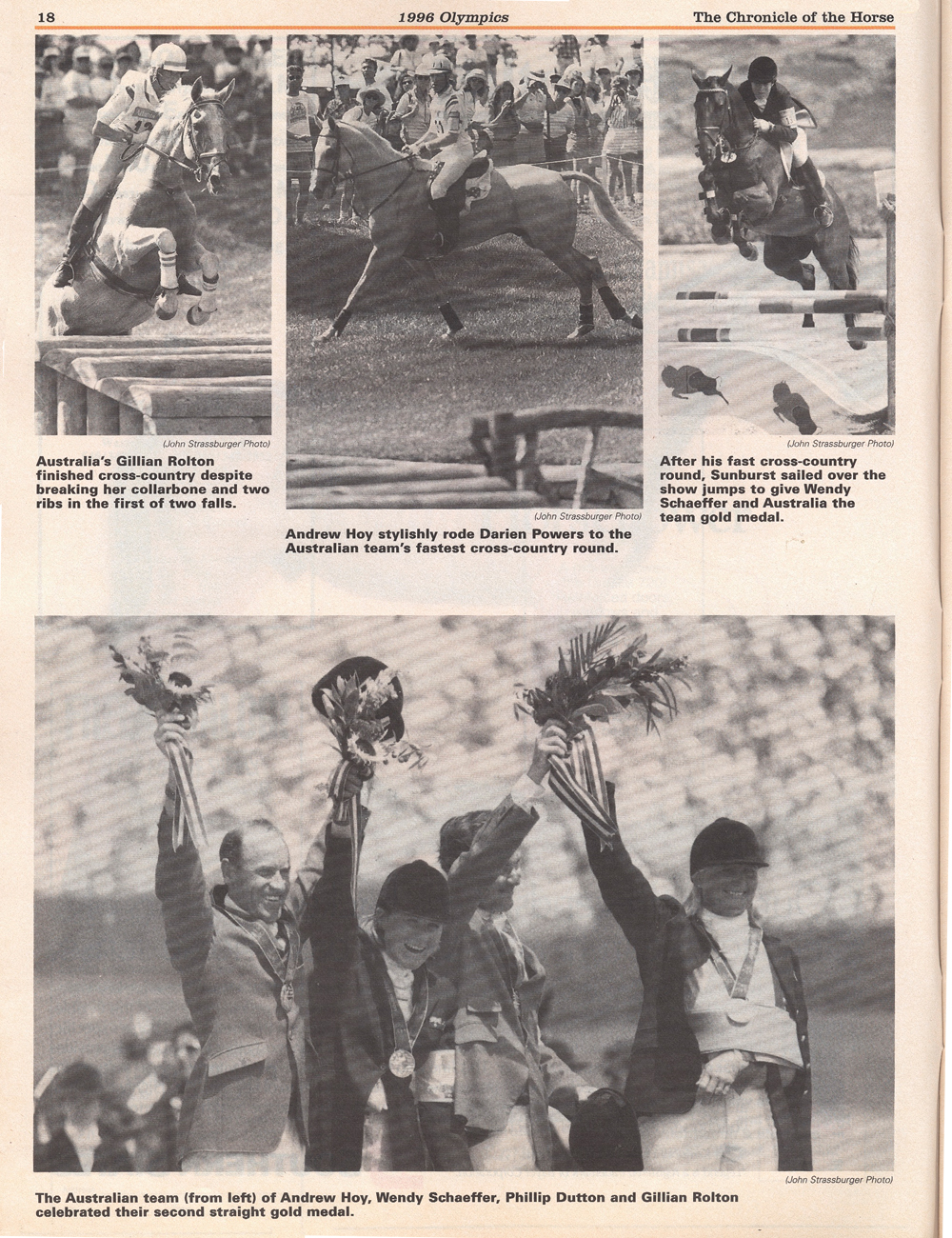The Olympics are always full of drama—dashed hopes, dreams realized, tragedy and triumph, and 20 years ago, the Atlanta Games were no different.
From the rise of the O’Connor Event Team and Phillip Dutton, to the introduction of a new format, there’s plenty to look back on.
The U.S. team (David O’Connor on Giltedge, Karen O’Connor on Biko, Bruce Davidson on Heyday and Jill Henneberg on Nirvana II) headed to Atlanta in 1996 off a 12-year medal drought and brought home silver, while individual rider Kerry Millikin brought home individual bronze on Out And About.
“It’s been a bit of a dry spell,” David told Chronicle editor John Strassburger in the Aug. 16, 1996 issue. “This was a big deal for the USA after a 12-year stint, and to be a part of that is a highlight of my career.”
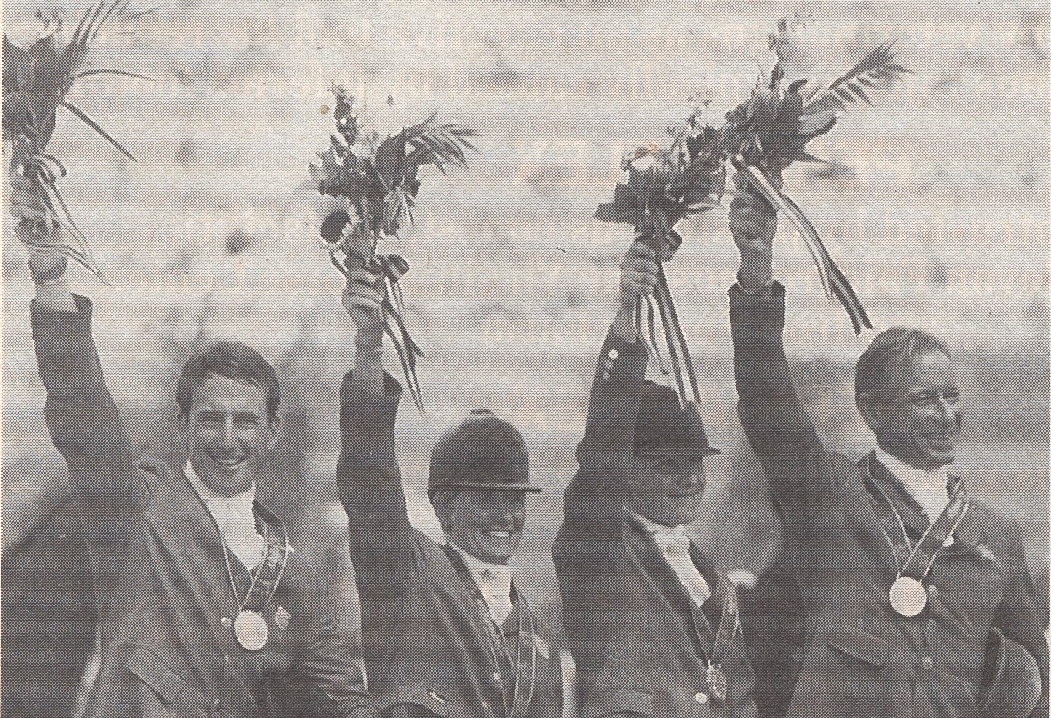
The U.S. team of (from left) David O’Connor, Karen O’Connor, Jill Henneberg and Bruce Davidson claimed team silver in the Atlanta Olympic Games 30 years ago. Photo by John Strassburger
Under the coaching of Captain Mark Phillips, who’d taken on the job three years prior, the team tackled Roger Haller’s course, but it didn’t come easy.
Biko incurred the first stop of his career at the second water jump, and Henneberg fell off and was eliminated at the same spot.
Team gold medalists Australia (Wendy Schaeffer on Sunburst, Phillip Dutton on True Blue Girdwood, Gillian Rolton on Peppermint Grove and Andrew Hoy on Darien Powers) also finished just three riders when Rolton withdrew during the endurance phase, but the rest jumped clear.
Schaeffer was still nursing a broken leg from two months earlier, while Rolton had two falls on cross-country and suffered a broken collarbone and two ribs.
Atlanta was the first time the eventing hosted two competitions after the International Olympic Committee decided that athletes couldn’t receive two medals for one performance, so Haller and show jumping course designer Linda Allen had to build two different courses for cross-country and show jumping. In 2004, they changed the format again, having horses and riders in contention for individual medals jumping another show jumping round after the team medals had been decided.
ADVERTISEMENT
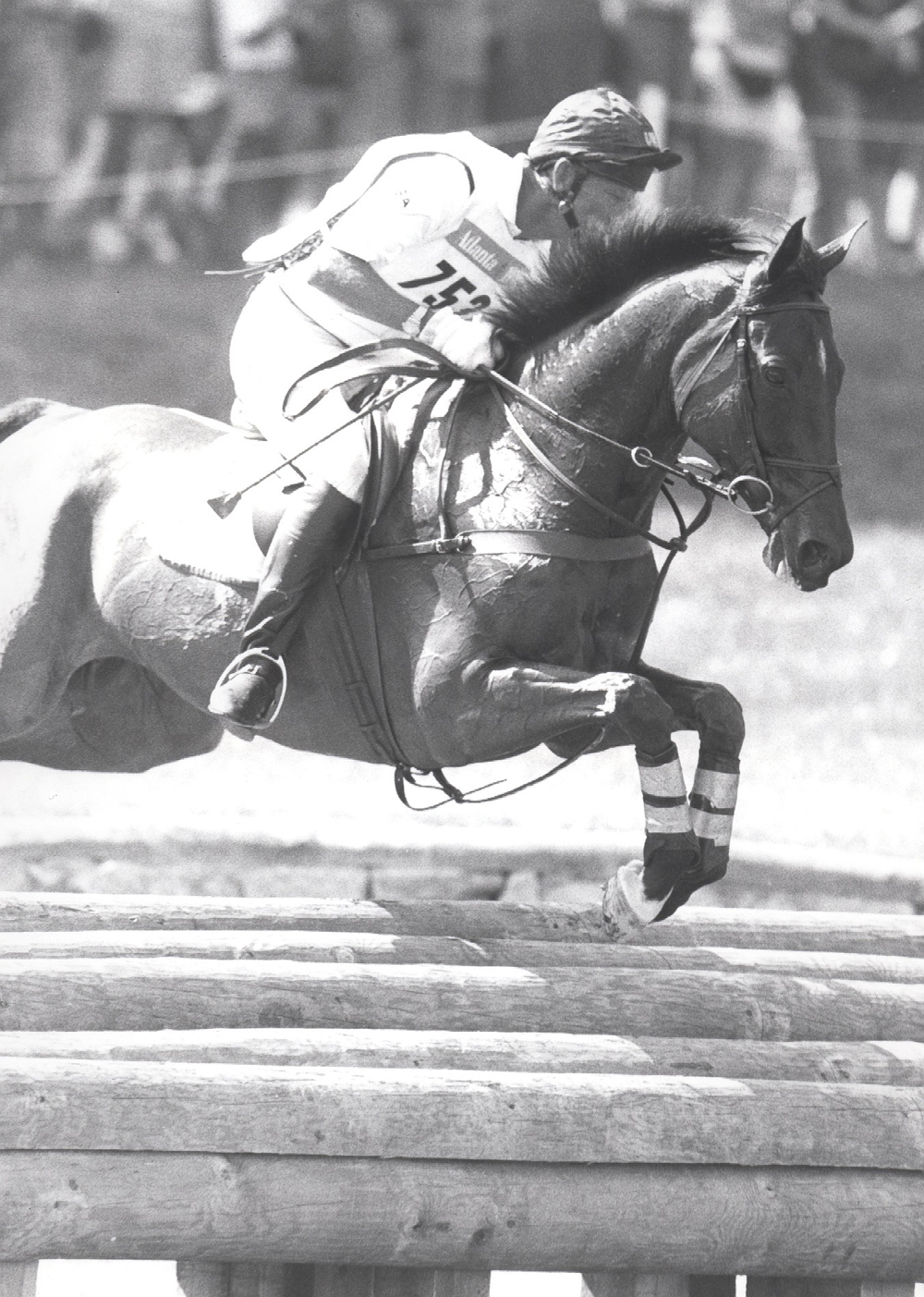
Bruce Davidson on Heyday, who helped the U.S. team earn silver. Photo by John Strassburger
Had there been only one event in ‘96, Schaeffer would have taken home individual gold in addition to her team gold medal.
“It always seemed right that I was a part of a team only,” she said. “A gold medal is a gold medal, and I’m grateful to be a part of the team.”
New Zealand’s Blyth Tait and the venerable Ready Teddy, then just 8 years old, took home the individual gold, followed by fellow countryman Sally Clark on Squirrel Hill and Millikin. O’Connor finished fifth on Custom Made and Mara DePuy was sixth on Hopper.
Tait, however, wasn’t a big fan of the separate competitions. “By splitting the competition, you take some of the best out of both,” Tait said. “I’d like to see it go back to the old way.”
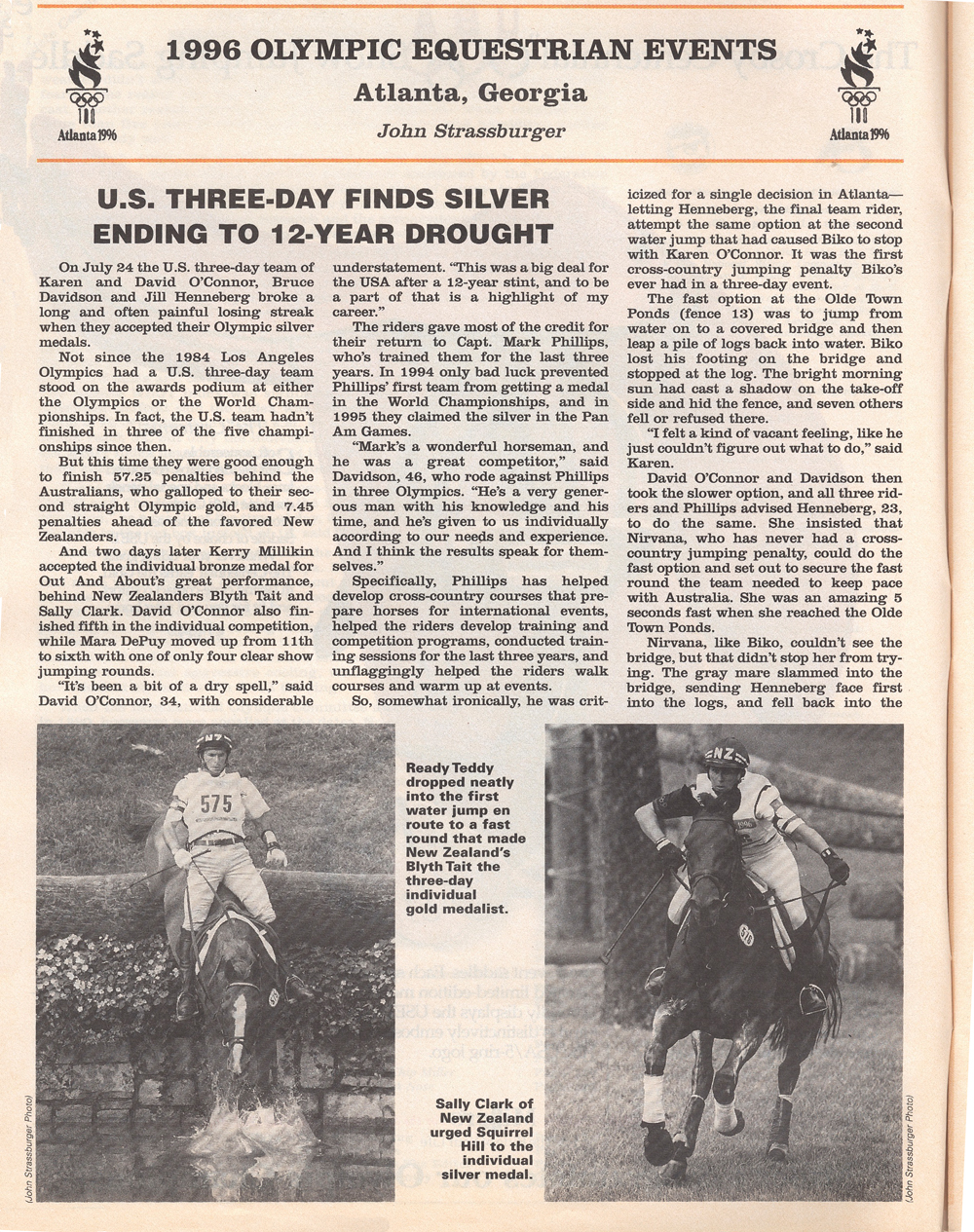
The Rise Of The O’Connors
The O’Connors had been together for 10 years before the 1996 Games and were married in 1993, but they fascinated the media in Atlanta and became de facto spokesmen.
“I almost feel like it’s a responsibility, not an honor,” said Karen. “It is an honor, but you feel like you have to take it on because exposure is what our sport needs.” They were interviewed by CCN and the Today Show as well as on the NBC Olympic coverage.
After the Olympics the couple was mobbed for autographs, and Karen said she didn’t mind.
ADVERTISEMENT
“Our goal was to have the Olympics provide a world stage for our sport, especially after all the bad press we got in 1992. The Olympics give you a chance to explain the sport to people who otherwise would never come into contact with it, and I think the sport has been portrayed for exactly what it is this time,” she said.
David was the lynchpin of the bronze-medal U.S. team putting in clean rounds on cross-country and show jumping aboard Giltedge. Karen had one stop at the 13th fence, a water jump, with Biko. “I felt a kind of vacant feeling, like he just couldn’t figure out what to do,” Karen said of the refusal.
That water jump was the place where U.S. team member Henneberg, who was then just 23, came to grief when Nirvana stopped twice. There was quite a bit of controversy as Henneberg’s fellow riders and Phillips had advised her to go the slow route at the water combination, but she chose to aim for the fast route. She had to retire after Nirvana mis-read the question and stopped, causing Henneberg to fall. They were both “dazed and bleeding and could go no farther.”
Jughead On The Main Stage
The Atlanta Games also showcased the talent of Dutton, then 33, who in 1996 had been in the United States for four years.
Dutton helped the Australian team to their gold medal aboard True Blue Girdwood, an off-the-track Thoroughbred who took Dutton to the 1994 World Equestrian Games and the 1995 Badminton CCI**** (England). Dutton had brought “Jughead”—then a preliminary horse—with him to the United States in 1992.
“He’s really taught me everything I know,” Dutton told the Chronicle in 1996. “I’d never ridden outside Australia before him, and now he’s taken me to England and Europe. I owe him everything.”
Strassburger wrote: “Jughead is clearly special to Dutton, largely due to the joy and intelligence he shows on cross-country. ‘He’s never stopped improving all the time,’ Dutton said. ‘I don’t have to do too much—he just sets himself up and analyzes what he’s going to do at each fence.’”
